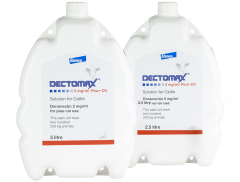Managing worms in dairy cows
Worms can cause reduced growth rates in youngstock and decreased milk yield in dairy cows1, so effective management of worms is fundamental to optimal herd health. The main types of worms affecting grazing cattle are2,3 gut worms and lungworms.
Gut worms in dairy cows
- Ostertagia ostertagi: this is the most clinically important worm, causing parasitic gastroenteritis during the grazing season. When inhibited larvae re-emerge, this causes type II ostertagiasis (severe often fatal diarrhoea) in late winter.
- Cooperia oncophora: often the most common gut worm in the first grazing season, it causes parasitic gastroenteritis and can have a major impact on growth rates.
Immunity to gut worms
Dairy cows naturally acquire immunity to worms while grazing and this immunity is maintained by continual exposure while at pasture.
For Cooperia, immunity develops after three to six months (one grazing season), while exposure over two grazing seasons is required to develop immunity to Ostertagia:

Overwintered larvae die off as they run out of energy (a). Calves faced with a low-moderate challenge produce increasing numbers of eggs from 3 weeks after infection. Pasture larval numbers increase rapidly from July onwards (b) (exact timing weather dependent).
Treatment of gut worms
Use Dectomax™ 5 mg/ml Pour-on Solution for Cattle strategically as part of a control programme to manage worm burdens in grazing youngstock whilst allowing exposure to worms to enable the development of natural immunity4.
Lungworm in dairy cows
Dictyocaulus viviparous: causes bronchitis and pneumonia resulting in persistent coughing, laboured breathing, weight loss and death in extreme cases. Lungworm can cause severe disease in adult animals where no immunity is present.
Immunity to lungworms
As with gut worms, cows develop immunity to lungworms after one to two months of grazing. Lungworm risk is weather dependent, but is generally highest from July to housing.
Treatment of lungworms
Pre-housing treatment with Dectomax™ up to 5 weeks before housing can manage this risk and also remove inhibited Ostertagia, which will control the risk of type II Ostertagiasis in late winter.

Dectomax™ 5 mg/ml Pour-on Solution for Cattle
For treatment of worms at housing or turnout and 8 weeks later; for control of lice & mange mites.

Liver fluke in dairy
Find out why liver fluke in dairy is a growing threat, management strategies and treatment options.
- AHDB
- COWS manual
- AHDB Beef BRP manual 9
- Vercruysse et al, Vet Para 58 (1995) 27-34, Control of gastrointestinal nematodes in first grazing season calves by two strategic treatments with doramectin.

